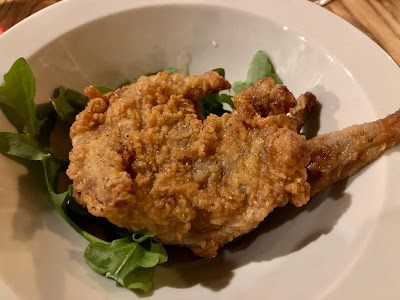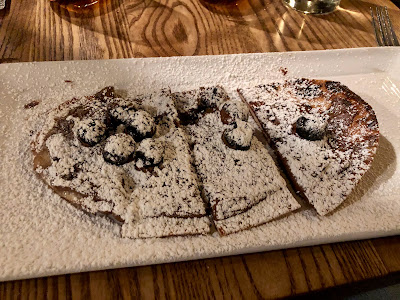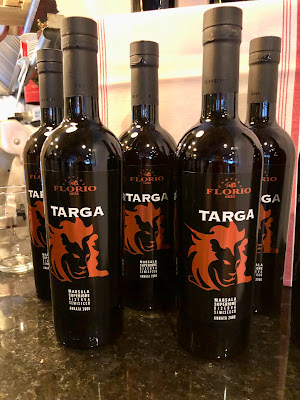I recently had the opportunity to taste a variety of Sicilian wines at a special wine dinner at A Tavola in Winchester, one of my favorite restaurants. Every month, A Tavola holds special events, and in April there will be a Cocktail Class and a Beer Dinner. At the Sicilian Wine Dinner, they served five courses of food, each paired with a different Sicilian wine. The five-course dinner and wine pairings cost $95 per person, and the wines were available for sale after the dinner for a special price.
Pictured above is Chef Joe Carli (on the left) and Ciro Pirone, who works for Horizon Beverage, and who led the wine tasting. Ciro was personable, charming and humorous, and full of information about Sicily and its wines.
It's said that Greeks, and more specifically the Chalcidians, were the first to plant vines on Sicily.
Today there are about 100,000 hectares of vineyards, with 62% planted on hillsides. Approximately 64% of their vineyards are planted with white grapes, 36% with red, and the vineyards are also broken down 80% with local/regional grapes and 20% with international grapes. The top three most planted grapes include Catarratto Bianco (33%), Nero d'Avola (16%) and Grillo (6.5%).
Prior to the start of the dinner, I opted for the Killer Bee cocktail ($15), which is made with Madre Mezcal, lime, and honey. It was refreshing, with only a hint of sweetness, some tartness from the lime, and the nice taste of the Mezcal. A fine way to start any meal.
Our first course of the evening was a Jonah Crab Bruschetta, made with preserved lemon, roasted garlic aioli & thyme. Sweet crab with a nice blend of flavors from the other ingredients atop tasty grilled bread. It was bright, like a taste of spring.
Accompanying this dish was the 2019 Duca di Salaparuta 'Kados' Grillo ($18), made from 100% Grillo, a white grape that is commonly used on Sicily, especially for producing Marsala wine. More frequently now, it's also being produced on its own, as a still white wine. About 55% of the wine was fermented in small oak casks for about forty days, and the entire wine aged in the bottle for at least three months. With about a 13% ABV, this wine had a pleasing nose of citrus and floral notes, and on the palate, it was bright, fresh and crisp, with tasty notes of citrus and a little salinity. An excellent wine for seafood, and it was a nice companion to the Jonah crab.
The second course was Chicken Fried Quail, which was buttermilk brined & crispy fried, with the addition of a Nashville hot honey sauce. I love quail, and this was an excellent preparation, with a delicious and crisp exterior coating, sweet and flavorful quail meat, and a little sweetness and a mild spicy heat from the sauce. More restaurants should serve quail.
The second wine was the fine 2018 Duca di Salaparuta 'Làvico' Nerello Mascalese ($25), made from 100% Nerello Mascalese, a red grape that is predominantly found on Sicily. The grapes for this wine were grown on the slopes of Mount Etna, at an altitude of about 600-800 meters. The wine was aged for at least 12 months in small, fine oak casks, and had about a 13.5% ABV. In some respects, this wine resembled Pinot Noir, being light bodied with bright cherry flavors, but this wine also had some intriguing notes of cranberry, a touch of balsamic, and some subtle herbal notes. Overall, it was complex and silky smooth, well balanced, with lots of acidity and possessed of a lengthy and pleasant finish. Absolutely delicious and highly recommended. Although it went very well with the quail, it was also mentioned (and I'd agree) that it would pair wonderfully with pork dishes.
The third tasty course was the Spaghetti al limone, with beef bresaola and aged parmesan. The well-made pasta had a more subtle lemon flavor, enhancing the dish, and helping to provide some acidity for the silky and delicious bresaola. Lemon can sometimes overwhelm these type of dishes but Chef Carli used restraint, elevating the dish. As I've frequently said, Chef Carli makes amazing pasta dishes. This is definitely a dish I'd order again.
The next wine was the 2019 Duca di Salaparuta 'Passo alle Mule' Nero d'Avola ($25), made from 100% Nero d'Avola, the main red grape of Sicily. The wine spent at least 10 months in very fine-grained oak wood and it was aged in the bottle for about 6 - 8 months. With about a 14% ABV, the wine had a dark red color, and an appealing nose of red berries and vanilla. On the palate, it was more full bodied, with flavors of cherries, raspberries, vanilla and dark spices.
Our final savory course was Rohan Duck, a braised leg with vincotto & a wood oven-roasted San Marzano tomato. Rohan Duck is an exclusive product of D’Artagnan, a hybrid of heritage breeds, and it's an excellent tasting duck. This dish was certainly no exception, with a delightful crispy skin, and plenty of savory, delicious and tender meat. So much more flavor than a chicken. This is probably one of the best dishes I've had in 2022. A Tavola offers duck specials, on a fairly regular basis, and I'd highly recommend any and all of them.
With the duck, we sipped the 2017 Duca di Salaparuta 'Duca Enrico' Nero d'Avola ($50), the flagship wine of this winery and an icon in Sicily. It was the first 100% Nero d’Avola label, in 1984, in the history of Sicilian wine. It was aged for at least 18 months in fine oak casks and then another 18 months in the bottle. With about a 14.5% ABV, this wine possessed an alluring aroma of black fruits, mild floral notes, and subtle spices. On the palate, it was complex and engaging, compelling and delicious. Notes of blackberry and ripe plum, subtle spices, earthy notes, smooth tannins, good acidity, and a lingering finish. A superb wine that was bold yet restrained, silky and mesmerizing. Highly recommended and well worth the splurge! Ciro also mentioned this wine paired well with horse, a big dish in Italy. I can't comment on that pairing, but the wine was sublime with the Rohan duck.
For dessert, we had a Nutella flatbread with cherries, covered in powdered sugar. The thin flatbread was pleasant with the hazelnut & chocolate of the Nutella, and the brightness of the cherries. My personal preference though would have been much less powdered sugar.
The final wine of the evening was a stunner, something more unique, which was an eye-opener as to a wine category that is ignored by so many people. Many people know of Marsala wine only as something they cook with, and not something they would choose to drink. Most wine shops, unless they specialize in Italian wines, probably only stock the least expensive Marsala, if even that. My own experience with drinking Marsala wine is extremely limited as well, more from a lack of opportunity than anything else.
Marsala is a fortified wine, with DOC status, which may be dry or sweet, and is produced in the Marsala region of Sicily. It is produced in a manner similar to the solar system which is used to make Sherry. Marsala is commonly made from white grapes, such as Grillo, Inzolia, Catarratto and Damaschino. These wines are categorized by their color, sweetness and aging, and it's commonly served after dinner or with dessert, although sometimes it will be paired with various dinner courses.
The 2006 Florio 'Targa' Marsala Superior Riserva Semisecco (500ml/$25) was produced from 100% Grillo, and was aged for at least seven years in Slavonian, 1800-liter oak barrels. Florio is the oldest Marsala house on Sicily. With a 19% ABV, it had a bright amber color and on the nose it reminded me strongly of an aged Amontillado Sherry. On the palate, it continued to remind me of Amontillado, with notes of dried fruit, citrus notes, a subtle nuttiness, and a mild sweetness. Such an intriguing and delicious wine, it opened up my eyes to the potential of Marsala. Why isn't there more Marsala of this quality available in most wine stores? Highly recommended!
The 2006 Florio 'Targa' Marsala Superior Riserva Semisecco (500ml/$25) was produced from 100% Grillo, and was aged for at least seven years in Slavonian, 1800-liter oak barrels. Florio is the oldest Marsala house on Sicily. With a 19% ABV, it had a bright amber color and on the nose it reminded me strongly of an aged Amontillado Sherry. On the palate, it continued to remind me of Amontillado, with notes of dried fruit, citrus notes, a subtle nuttiness, and a mild sweetness. Such an intriguing and delicious wine, it opened up my eyes to the potential of Marsala. Why isn't there more Marsala of this quality available in most wine stores? Highly recommended!
I strongly encourage you to dine at A Tavola, or attend one of their wine/beer dinners, and I also encourage you to drink the wines of Sicily.















No comments:
Post a Comment